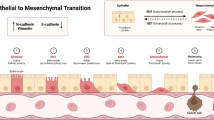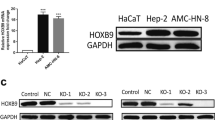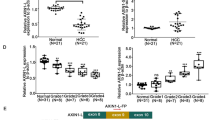Abstract
The ability of a promoter to initiate transcription is important for the control of gene expression. Mutations in the DNA polymerase beta (po1β) promoter may affect the transcription of this gene; however, the relationship between these mutations and the upregulation of the expression of po1β remains unclear. Therefore, in the present study, three po1β promoter mutants (M1, −37 C→A; M2, −114 G→A, −37 C→A; M3, −194 T→C) were generated to examine the effect of promoter mutations on polβ gene expression and sensitivity to cisplatin. We found that the M1 and M2 mutant polβ promoter constructs showed higher RLA than the wild-type polβ promoter (P < 0.01), whereas the activity of the M3 polβ promoter did not differ significantly from that of the wild-type polβ promoter (P > 0.05). The expression levels of polβ mRNA and protein were significantly higher (P < 0.01) and the sensitivity to cisplatin was significantly lower (P < 0.05) in Eca9706−/−-M1 and Eca9706−/−-M2 cells than in Eca9706−/−-W. The expression levels of polβ mRNA and protein and the sensitivity to cisplatin were not significantly different between Eca9706−/−-M3 and Eca9706−/−-W cells (P > 0.05).These results revealed that specific mutations of the polymerase beta gene promoter significantly enhanced the gene’s transcriptional activity. These mutations correspondingly increased the gene’s mRNA and protein product, at the same time reduced the esophageal cancer cells’ sensitivity to cisplatin





Similar content being viewed by others
References
Idriss HT, Al-Assar O, Wilson SH (2002) DNA polymerase beta. Int J Biochem Cell Biol 34(4):321–324
Bergoglio V, Pillaire MJ, Lacroix-Triki M et al (2002) Deregulated DNA polymerase beta induces chromosome instability and tumorigenesis. Cancer Res 62:3511–3514
Canitrot Y, Frechet M, Servant L et al (1999) Overexpression of DNA polymerase beta: a genomic instability enhancer process. FASEB J 13:1107–1111
Canitrot Y, Cazaux C, Freehet M et al (1998) Overexpression of DNA polymerase beta in cell results in a mutator phenotype and a decreased sensitivity to anticancer drugs. Proc Natl Acad Sci USA 95:12586–12590
Sliwinski T, Ziemba P, Morawiec Z et al (2007) Polymorphisms of the DNA polymerase beta gene in breast cancer. Breast Cancer Res Treat 103(2):161–166
Lang T, Dalal S, Chikova A et al (2007) The E295K DNA polymerase beta gastric cancer-associated variant interferes with base excision repair and induces cellular transformation. Mol Cell Biol 27(15):5587–5596
Tan XH, Zhao M, Pan KF et al (2005) Frequent mutation related with overexpression of DNA polymerase beta in primary tumors and precancerous lesions of human stomach. Cancer Lett 220(1):101–114
Eydmann ME, Knowles MA (1997) Mutation analysis of 8p gene POLB and PPP2CB in bladder cancer. Cancer Genet Cytogenet 93(2):167–171
Dalal S, Hile S, Eckert KA, Sun KW et al (2005) Prostate-cancer-associated I260M variant of DNA polymerase beta is a sequence-specific mutator. Biochemistry 44(48):15664–15673
Zhao GQ, Wang T, Zhao Q et al (2005) Mutation of DNA polymerase beta in esophageal carcinoma of different regions. World J Gastroenterol 11(30):4618–4622
Dong Z, Zhao G, Zhao Q et al (2002) A study of DNA polymerase β mutation in human esophageal cancer. Natl Med J China 82(13):899–902
Zhao G, Wang T, Zhao M et al (2005) Detection of DNA polymerase β mRNA in esophageal carcinoma tissue. J Zhengzhou Univ (Med Sci) 40(4):603–605
Dong ZM, Zheng NG, Wu JL, Li SK, Wang YL (2006) Difference in expression level and localization of DNA polymerase beta among human esophageal cancer focus, adjacent and corresponding normal tissues. Dis Esophagus 19:172–176
Albertella MR, Lau A, O’Connor MJ (2005) The overexpression of specialized DNA polymerases in cancer. DNA Repair (Amst) 4(5):583–593
Sobol RW, Foley JF, Nyska A et al (2003) Regulated over-expression of DNA polymerase beta mediates early onset cataract in mice. DNA Repair (Amst) 2(5):609–622
Li Y-B, Yu Y-L, Zhao G-Q, Wang H, Dong Z-M (2008) Mutation analysis of DNA polymerase β gene promoter in human esophageal cancer. World Chi J Dig 16(23):2649–2652
Feng L, Ma Y, Zhao G, Li M, Sun S, Dong Z, Huang Y (2010) Establishment and characterization of DNA pol β knockout human esophageal carcinoma cell line EC9706. Life Sci J 7(2):13–18
Widen SG, Kedar P, Wilson SH (1988) Human beta-polymerase gene. Structure of the 5′-flanking region and active promoter. J Biol Chem 263(32):16992–16998
Prasad R, Shock DD, Beard WA et al (2010) Passing the baton: substrate channeling in mammalian base excision repair pathways. J Biol Chem 285:40479–40488
Shrivastav N, Li D, Essigmann JM (2010) Chemical biology of mutagenesis and DNA repair: cellular responses to DNA alkylation. Carcinogenesis 31:59–70
Kidane D, Dalal S, Keh A, Liu Y, Zelterman D, Sweasy JB (2011) DNA polymerase beta is critical for genomic stability of sperm cells. DNA Repair 10:390–397
Asagoshi K, Liu Y, Masaoka A et al (2010) DNA polymerase beta dependent long patch base excision repair in living cells. DNA Repair 9:109–119
Vermeulen C, Verwijs-Janssen M, Begg AC, Vens C (2008) Cell cycle phase dependent role of DNA polymerase β in DNA repair and survival after ionizing radiation. Radiother Oncol 86:391–398
Neijenhuis S, Verwijs-Janssen M, Kasten-Pisula U et al (2009) Mechanism of cell killing after ionizing radiation by a dominant negative DNA polymerase β. DNA Repair (Amst) 8:336–346
Chan K, Houlbrook S, Zhang QM, Harrison M, Hickson ID, Dianov GL (2007) Overexpression of DNA polymerase beta results in an increased rate of frameshift mutations during base excision repair. Mutagenesis 22(3):183–188
Nicolay NH, Helleday T, Sharma RA (2012) Biological relevance of DNA polymerase β and translesion synthesis polymerases to cancer and its treatment. Curr Mol Pharmacol 5(1):54–67
Canitrot Y, Cazaux C, Fréchet M, Bouayadi K, Lesca C, Salles B, Hoffmann JS (1998) Overexpression of DNA polymerase beta in cell results in a mutator phenotype and a decreased sensitivity to anticancer drugs. Proc Natl Acad Sci 95(21):12586–12590
Bergoglio V, Canitrot Y, Hogarth L, Minto L, Howell SB, Cazaux C, Hoffmann JS (2001) Enhanced expression and activity of DNA polymerase beta in human ovarian tumor cells: impact on sensitivity towards antitumor agents. Oncogene 20(43):6181–6187
Acknowledgments
This study was supported by National Natural Science Foundation of China (81272188).
Author information
Authors and Affiliations
Corresponding authors
Additional information
Tao Wang and Wenqiao Zang contributed equally.
Rights and permissions
About this article
Cite this article
Wang, T., Zang, W., Ma, Y. et al. DNA polymerase beta promoter mutations affect gene transcription, translation and the sensitivity of esophageal cancer cells to cisplatin treatment. Mol Biol Rep 40, 1333–1339 (2013). https://doi.org/10.1007/s11033-012-2177-8
Received:
Accepted:
Published:
Issue Date:
DOI: https://doi.org/10.1007/s11033-012-2177-8




